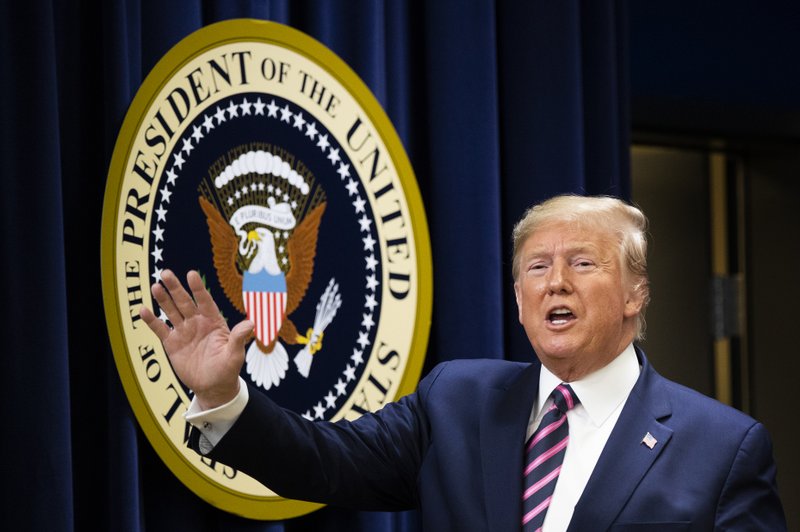WASHINGTON -- The Trump administration is celebrating the launch of Space Force, the first new military service in more than 70 years.
President Donald Trump signed the 2020 National Defense Authorization Act, which includes the creation of the new service, on Friday.
It is part of a $1.4 trillion government spending package -- including the Pentagon's budget -- that provides a steady stream of financing for Trump's U.S.-Mexico border fence and reverses unpopular and unworkable automatic spending cuts to defense and domestic programs.
Space Force, for the military, is seen as an affirmation of the need to more effectively organize for the defense of U.S. interests in space -- especially satellites used for navigation and communication. Space Force is not designed or intended to put combat troops in space.
Defense Secretary Mark Esper told reporters on Friday: "Our reliance on space-based capabilities has grown dramatically, and today outer space has evolved into a warfighting domain of its own." Maintaining dominance in space, he said, will now be Space Force's mission.
Space has become increasingly important to the U.S. economy and to everyday life. The Global Positioning System, for example, provides navigation services to the military as well as civilians. Its constellation of about two dozen orbiting satellites is operated by the 50th Space Wing from an operations center at Schriever Air Force Base in Colorado.
In a report last February, the Pentagon asserted that China and Russia have embarked on major efforts to develop technologies that could allow them to disrupt or destroy American and allied satellites in a crisis or conflict.
"The United States faces serious and growing challenges to its freedom to operate in space," the report said.
When he publicly directed the Pentagon in June 2018 to begin working toward a Space Force, Trump spoke of the military space mission as part of a broader vision.
"My administration is reclaiming America's heritage as the world's greatest space-faring nation," he said. "When it comes to defending America, it is not enough to merely have an American presence in space. We must have American dominance in space."
Instead of being its own military department, like the Navy, Army and Air Force, the Space Force will be administered by the secretary of the Air Force. The law requires that the four-star general who will lead Space Force, with the title of Chief of Space Operations, will be a member of the Joint Chiefs of Staff, but not in Space Force's first year. That leader is likely to be Air Force Gen. John W. Raymond, the commander of U.S. Space Command.
Space Force is the first new military service since the Air Force was spun off from the Army in 1947. Space Force will be the provider of forces to U.S. Space Command, a separate organization established earlier this year as the overseer of the military's space operations.
The division of responsibilities and assets between Space Force and Space Command has not been fully worked out.
Space Force will be tiny, compared to its sister services. It will initially have about 200 people and a first-year budget of $40 million. The military's largest service, the Army, has about 480,000 active-duty soldiers and a budget of about $181 billion. The Pentagon spends about $14 billion a year on space operations, most of which is in the Air Force budget.
Kaitlyn Johnson, a space policy expert at the Center for Strategic and International Studies, sees the creation of Space Force as an important move but doubts it will prove as momentous as Trump administration officials suggest. Vice President Mike Pence has touted Space Force as "the next great chapter in the history of our armed forces." And Esper earlier this week called this an "epic moment" in recent American military history.
Johnson says Democrats' opposition to making Space Force a separate branch of the military means it could be curtailed or even dissolved if a Democrat wins the White House next November.
"I think that's a legitimate concern" for Space Force advocates, she said. "Just because it's written into law doesn't mean it can't be unwritten," she said.
Some in Congress had been advocating for a Space Force before Trump entered the White House, but his push for legislation gave the proposal greater momentum.
Trump's first defense secretary, James Mattis, was initially cool to the idea, arguing against adding new layers of potentially expensive bureaucracy. Mattis' successor, Esper, has been supportive of Space Force. In September he said it will "allow us to develop a cadre of warriors who are appropriately organized, trained and equipped to deter aggression and, if necessary, to fight and win in space." He added, "The next big fight may very well start in space, and the United States military must be ready."
A Section on 12/21/2019
